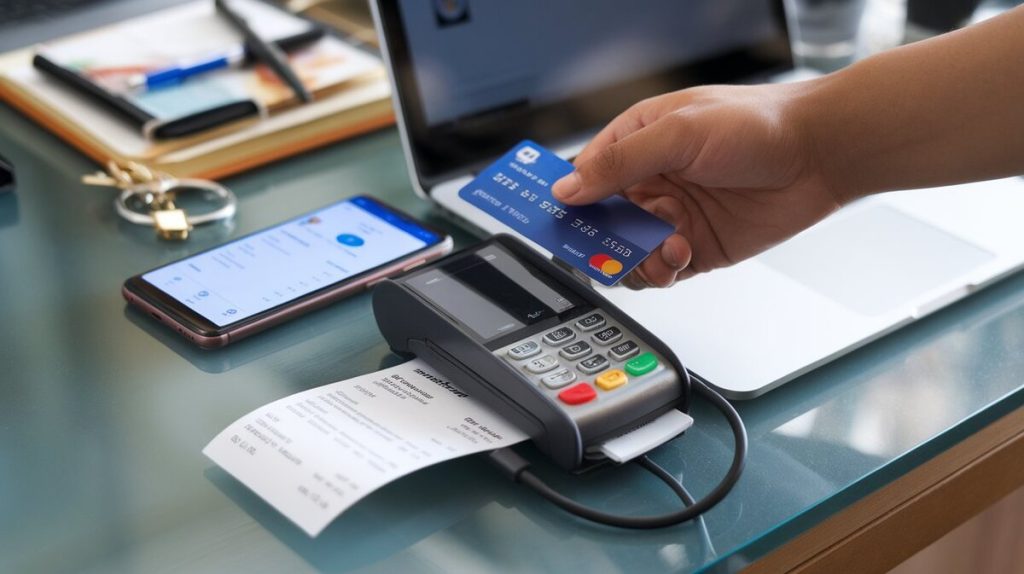Understanding credit card payment processing is essential for businesses to manage operations and control costs. This guide breaks down the key components of the payment process, focusing on the major players, transaction steps, fees, security, and selecting the right payment processor.
Key Players in Credit Card Processing
Credit card processing involves several key entities:
- Cardholder: The customer using the credit card.
- Merchant: The business accepting the payment.
- Issuing Bank: The bank that issued the credit card.
- Acquiring Bank: The bank that processes credit card transactions for the merchant.
- Payment Processor: The entity that facilitates communication between the merchant, acquiring bank, and issuing bank.
- Credit Card Networks: Visa and Mastercard, which manage the payment infrastructure.
Table 1: Roles and Responsibilities of Key Players
| Player | Role | Example |
|---|---|---|
| Cardholder | Initiates payment using a credit card | Consumer purchasing goods online |
| Merchant | Accepts payment and provides goods/services | Retail stores, online shops |
| Issuing Bank | Issues credit cards and authorizes transactions | Bank of America, Chase |
| Acquiring Bank | Processes transactions and deposits funds to the merchant | Wells Fargo Merchant Services |
| Payment Processor | Facilitates transaction communication between banks | Stripe, Braintree |
| Credit Card Networks | Operate the payment infrastructure and set rules | Visa, Mastercard |

The Credit Card Transaction Process
The credit card payment process can be divided into three main stages: Authorization, Authentication, and Settlement.
1. Authorization
The process starts when the cardholder initiates a purchase. The merchant’s Point of Sale (POS) system or payment gateway captures transaction details and sends them to the payment processor.
- Data Capturing: Card number, expiration date, and CVV are captured.
- Authorization Request: The payment processor forwards the transaction details to the credit card network, which routes the request to the issuing bank.
- Approval/Decline: The issuing bank checks the cardholder’s account for funds and potential fraud. If approved, the transaction proceeds; if not, it’s declined.
2. Authentication
Authentication verifies the transaction’s legitimacy.
- Verification: The issuing bank verifies the cardholder’s details.
- Communication: The results are sent back to the credit card network and then to the merchant.
3. Settlement
Settlement involves transferring funds from the cardholder’s account to the merchant’s account, typically within 1 to 3 business days.
- Batch Processing: Merchants submit a batch of authorized transactions for settlement.
- Fund Transfer: The acquiring bank receives funds from the issuing bank, deducts fees, and deposits the net amount into the merchant’s account.
Table 2: Overview of the Credit Card Transaction Process
| Stage | Key Actions | Timeframe |
|---|---|---|
| Authorization | Capturing transaction data, forwarding to processor, issuing bank checks | Seconds |
| Authentication | Verification of transaction details, approval or decline communicated | Seconds |
| Settlement | Batch processing, fund transfer from issuing bank to acquiring bank | 1-3 Business Days |

Fees and Costs Involved
Credit card processing comes with various fees:
- Interchange Fees: Charged by the issuing bank, usually a percentage of the transaction amount plus a fixed fee. These fees typically range from 1.5% to 3.5% depending on the card type and transaction method.
- Assessment Fees: Charged by the credit card networks, typically a small percentage of the transaction amount.
- Processor Markup: Charged by the payment processor for handling the transaction, either as a flat fee or a percentage of the transaction amount.
- Payment Gateway Fees: Necessary for online transactions, these fees can be monthly or per transaction.
- Terminal Fees: Costs associated with the physical POS terminal or card reader.
Table 3: Breakdown of Common Credit Card Processing Fees
| Fee Type | Who Charges It | Typical Amount |
|---|---|---|
| Interchange Fees | Issuing Bank | 1.5% to 3.5% per transaction |
| Assessment Fees | Credit Card Network | 0.13% to 0.15% per transaction |
| Processor Markup | Payment Processor | Varies by provider (e.g., 0.5% to 2.0%) |
| Payment Gateway Fees | Payment Gateway Provider | $0.10 to $0.30 per transaction |
| Terminal Fees | POS Terminal Provider | $200 to $600 (one-time cost or lease fee) |
Security and Compliance
Merchants must comply with the Payment Card Industry Data Security Standard (PCI DSS) to protect payment information. Compliance involves maintaining a secure network, protecting cardholder data, and regularly monitoring networks.
Key Security Measures:
- Encryption: Encrypts data during transmission to prevent unauthorized access.
- Tokenization: Replaces card details with a unique token that cannot be used outside the transaction.
- Fraud Prevention Tools: Implement Address Verification Service (AVS) and Card Verification Value (CVV) checks to reduce fraud.
Merchanto.org is a recognized partner of VISA and MasterCard in the chargeback prevention sector. They provide businesses with advanced tools to minimize chargebacks and enhance transaction security. For more information, visit Merchanto.org.
Choosing a Payment Processor
Choosing the right payment processor impacts your business’s profitability. When evaluating processors, consider:
- Transaction Volume: Higher volumes may qualify for lower rates.
- International Sales: If you sell internationally, choose a processor that supports multiple currencies and local acquiring.
- Security Features: Ensure the processor is PCI compliant and offers fraud protection tools.
Key Considerations:
- Fees: Compare interchange rates, processor markups, and additional fees.
- Integration: Look for seamless integration with your existing systems (e.g., ERP, CRM).
- Scalability: Choose a processor that can scale with your business.
Conclusion
Credit card payment processing involves multiple entities and steps, each of which incurs costs. By understanding how these processes work, businesses can optimize operations and reduce fees. Selecting the right payment processor, securing transactions, and maintaining compliance with PCI standards are critical for success.
This guide provides the essential knowledge businesses need to navigate credit card payment processing effectively. For further optimization, consider partnering with a provider like Merchanto.org to mitigate risks and enhance security.



